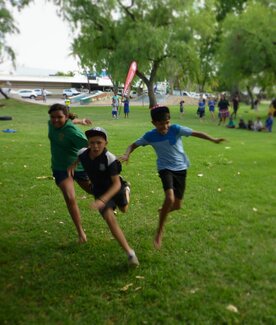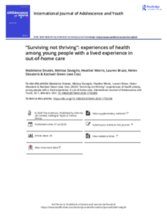

Displaying 171 - 180 of 677
This preliminary scoping study aimed to explore approaches to family partnering within Australian therapeutic residential care (TRC), along with elements of best practice.
This article reports on initial research from a survey study to describe the current state of play from practitioners into their perceptions and practices of children's participation in family support contexts.
In this article, two case studies chart show that if foster carers are able to reflect upon the painful and unwanted feelings evoked in them, and acknowledge and take responsibility for what has become enacted in the placement, there may be an opportunity for harmful dynamics to be processed and repaired.
The manner in which foster children present and the frightening feelings this may trigger can overwhelm the foster carers’ capacity to sustain a nurturing stance in relation to the children and jeopardise the placement. In this article, two case studies chart such a dynamic and show that if carers are able to reflect upon the painful and unwanted feelings evoked in them, and acknowledge and take responsibility for what has become enacted in the placement, there may be an opportunity for this harmful dynamic to be processed and repaired.
"Aboriginal groups say the NSW government’s child protection reforms don’t do enough to tackle the over-representation of Indigenous children and youths in state care, labelling the plans as unremarkable and leaving them feeling disrespected," says this article from the Sydney Morning Herald.
In this study the authors examined the relative contributions of maternal versus paternal criminal offending or mental health problems in relation to the time to the offspring’s first report to child protection services, or first placement in out of home care (OOHC), using administrative records for a population sample of 71,661 children.
This study aimed to explore the experiences and perceptions of health among young people (YP) who have previously lived in care.
Employing a systematic scoping methodology, this review examined the scope and breadth of literature focusing on children and young people living in residential care in Australia who have experienced sexual exploitation.
This article from ABC News explores the stories of some of "the more than 500,000 so-called Forgotten Australians who suffered abuse and neglect while living in out-of-home care over the past century" and how they have found healing through "a storytelling project that helps participants reimagine their past and invent new ways to see their stories."
The purpose of this study was to examine whether eliminating variation in information presented to multi-disciplinary teams eliminates variation in the proportion accepted for a child protection alert.

